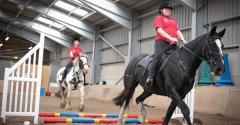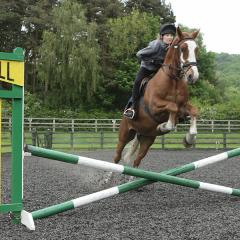In the UK, the equine industry is big business, with a turnover in the region of 1 billion pounds every year.
As a horse care apprentice, you could find yourself working in a wide variety of sectors relating to horses, including horse racing, driving, endurance, dressage, horse trials and show jumping and many other supporting industries where horse care is essential such as riding schools, livery yards, competition yards and rescue centres.
Apprentices gain real, hands-on experience of what its like to work in a professional environment around horses. As an apprentice, you'll work alongside senior staff members who will instruct you and build your skills, you'll earn an apprenticeship wage and you'll be based at an actual employer's premises, gaining valuable work experience as you go. You'll also be expected to complete some written work and/or practical work, which may - depending on the apprenticeship - require you to attend college to complete the work.
Horse Care Apprenticeship Levels
In the UK, education is classed into different levels, starting from 1 and ending with 8.
Apprenticeships relate directly to education - the idea behind an apprenticeship in horse care is that you receive an equivalent 'level' qualification after completion, making an apprenticeship an ideal alternative if you think college might not be for you.
Horse Care apprenticeships are available at the following levels:
- Level 2 (Intermediate) - applicants must be 16 years of age, and show the ability and drive to successfully complete the apprenticeship programme. This route is generally considered to be the equivalent of 5 good GCSE pass grades
- Level 3 (Advanced) - at this level, an employer may request at least 3 good GCSE grades from an applicant, or want previous experience of working in the industry. This depends entirely on the employer. An advanced level apprenticeship is generally considered to be the equivalent of 2 A level passes
Which apprenticeship might be right for you will likely depend on your previous experience and your grades at school. This is however not always the case - depending on the employer, they might consider you for a level 3 apprenticeship if, for example, you have plenty of experience working with horses but don't have the grades from school.
If you'd like more advice on which apprenticeship to take, or would like to register your interest for a horse care apprenticeship, we can help. Please contact the East Durham College apprenticeship team directly by calling 0191 518 8294 or 0191 518 5587 or you can email apprenticeships@eastdurham.ac.uk.
What Jobs are Available for Horse Care Apprentices?
Every apprenticeship is generally different from another - the work you complete will vary depending on your employer's business needs, the sector they work in and the apprenticeship they are offering.
You could find yourself completing jobs such as:
- At Level 2 (Intermediate) - you may work as an assistant groom (non-ride and ride), an assistant stud groom/hand, a trek assistant, a supporting harness horse trainer, an assistant groom (agriculture), an apprentice jockey or a conditional jockey
- At Level 3 (Advanced) - you may work as a groom, an assistant yard manager, a trek leader, an intermediate instructor/level 3 coach, a jockey, a harness horse groom, a harness horse driver, an assistant harness horse trainer or a harness horse groom (agriculture)
Depending on your employer, you may get the opportunity to work in more than one of these roles, spending your time learning different skills and gaining experience ready for your next step after your apprenticeship.
Apprenticeship Benefits
Unsure if an apprenticeship is right for you? There are many benefits of doing a horse care apprenticeship, including:
- A Start in the Industry You're Interested in Working In - on your apprenticeship you'll gain real, practical, hands-on experience in horse care.
- Learn While You Earn - apprentices are paid at least an apprenticeship wage, set out by the government. Depending on the employer, they may give you more than this amount or up your wage during your apprenticeship, but all employers must pay apprentices at least the apprenticeship wage.
- Paid Holidays - just like normal employees, you'll be entitled to fully paid holidays as part of your apprenticeship. By law you are entitled to at least 20 days holiday per year, although some employers offer more than this. Time off may also be given for study leave, depending on the role you are employed to do and the needs of your apprenticeship.
- Support - as an apprentice, your employer won't expect you to have knowledge of everything in your job role straight away - the idea is you build up your skills over time. You'll work alongside senior staff members who will instruct you and help you develop your skills along the way, and you'll also receive support from the company managing your apprenticeship. If you have any questions about your work, the best way to go about things or anything else - just ask your manager or senior staff member who'll be able to help you every step of the way.
- Good Career Prospects - as you've gained extensive experience of working in the industry during your apprenticeship, you'll be in an excellent position to apply for new jobs after its finished. Since most employers generally look for experienced staff, they'll look favourably on your apprenticeship and this may open up new opportunities for you. You may also be actually kept on as a full-time member of staff at the place where you completed your apprenticeship. Alternatively you could move on to further education and go to university to complete a degree relating to horse care.
Alternatives to an Apprenticeship
If you'd prefer to study, rather than take an apprenticeship, East Durham College can help.
At our Houghall Campus on the outskirts of Durham city, we have a recently-built equine centre complete with 24 stable block, tack room, workshops, social space and a purpose-built 1600m2 indoor equine arena to complement our existing all-weather arena and electronically-operated horse walker.
Students studying horse care at East Durham College can take part in a wide variety of modules from equine science and health and animal handling and feeding. Preparation for the workplace is also an important component of our equine courses, with plenty of work-related activities and work experience placements available during your course.
Those who achieve a full level 3 programme have the opportunity to apply for university entrance to study on higher education courses such as equine science, equine behaviour, equine sports performance and coaching, equine business management and a range of other courses in everything from veterinary nursing or bioveterinary science.
We currently offer the following equine courses at East Durham College:
- City & Guilds Entry Level 3 Diploma in Skills for Working Life (Horse Care)
- City & Guilds Level 1 Diploma in Land-Based Studies (Horse Care)
- City & Guilds Level 2 Diploma in Horse Care
- City & Guilds Level 3 Subsidiary Diploma in Horse Management
Register your interest in an Apprenticeship
If you can’t find a current Apprenticeship vacancy below that you are interested in, please use the short form further down the page to register your interest with the EDC Apprenticeship Team and they will contact you as a vacancy becomes available in the area(s) you are interested in.
Apprenticeship Vacancies
Please check out the live Apprenticeship vacancies below that are currently being advertised with some great organisations we are working with.
If you haven’t used the www.findapprenticeship.service.gov.uk Opens Government Apprentice site in a new window before you must create an account Opens Government site to register in a new window to apply. Creating an account allows you to:
- apply for an apprenticeship or traineeship
- track your apprenticeship applications
- receive alerts about new apprenticeships
To find out more information, please call the Apprenticeship Team on 0191 518 5508 or email apprenticeships@eastdurham.ac.uk.


